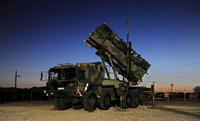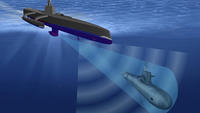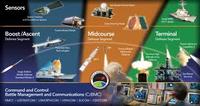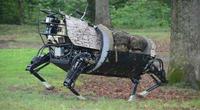-
U.S. troops arrive in Turkey to man missile defense batteries

Turkey, a NATO member, has asked the organization for missile defense battaeries to protect it against a possible attack by Syria; the United States, Germany, and the Netherland deployed Patriot missile batteries along the Syrian-Turkish border, with their nationals manning the weapons; U.S. troops arrived in Turkey on Friday to supervise the U.S.-supplied missiles
-
-
U.S.-born cleric Anwar al-Awlaki purchased tickets for 9/11 terrorists: FBI documents

Within two weeks of the 9/11 terrorist attacks, FBI investigators had information that New Mexico-born jihadi cleric Anwar al-Awlaki had purchased air travel tickets for some of the hijackers; the information is contained in newly released, and heavily redacted, FBI documents; it appears that after the 9/11 attacks, the FBI, rather than arrest al-Awlaki, tried to work with him or track him for intelligence purposes, to see whether he would lead the agency to sleeping-cell terrorists still in the United States; Al-Awlaki was killed by a CIA drone attack in Yemen in September 2011
-
-
Newspaper hires armed guards to watch editorial headquarters
A newspaper in Rockland County, New York offered its readers a map on its Web site which showed the names and addresses of all gun permit holders in Rockland and Westchester counties; worried about an angry reaction to the map, the newspaper hired private security guards to watch over its West Nyack headquarters
-
-
Unmanned vessel for continuous tracking of enemy submarines

DARPA looking for an unmanned naval vessel that can seek out and track quiet diesel submarines, forcing them to return to base and thus protecting friendly ships from attack
-
-
Flexible electronics to make night vision more accurate, easier to use
For soldiers and first responders, having accurate, high-resolution imaging capabilities may mean the difference between success and failure; electrical and computer engineers set out to make night vision more accurate and easier for soldiers, pilots, and first responders to use
-
-
Flexible electronics to make night vision more accurate, easier to use
For soldiers and first responders, having accurate, high-resolution imaging capabilities may mean the difference between success and failure; electrical and computer engineers set out to make night vision more accurate and easier for soldiers, pilots, and first responders to use
-
-
Comparing boost-phase to non-boost-phase ballistic missile defense

An expert panel set forth to provide an assessment of the feasibility, practicality, and affordability of U.S. boost-phase missile defense compared with that of the U.S. non-boost missile defense when countering short-, medium-, and intermediate-range ballistic missile threats
-
-
Less-lethal 12-gauge shotgun round for law enforcement unveiled
Innovative new round flattens, or “pancakes,” across a subject’s body on impact rather than keeping its shape as other rounds do
-
-
Privately funded gun buy-back programs proliferate

In the aftermath of the Connecticut mass shooting, private donors have donated hundreds of thousands of dollars to cities around the United States to fund gun buy-back programs; thousands of guns – and two rocket launchers – have been collected, but the impact on a gun-saturated society is likely to be small: this year alone the FBI has recorded 16.8 million instant background checks of gun buyers, 400,000 more than last year, which was a record year
-
-
Gun training for teachers gaining in popularity
Two hundred teachers in Utah are set to receive special firearms training — with a plastic gun — in order to carry concealed weapons in their classrooms in the future; in the aftermath of the mass shooting in the Sandy Hook Elementary School in Connecticut, gun training and gun safety classes for teachers are drawing attention
-
-
Broader background checks, denial criteria may help prevent mass-shooting catastrophes
Garen Wintemute, a leading authority on gun violence prevention and an emergency medicine physician at the University of California, Davis, believes broader criteria for background checks and denials on gun purchases can help prevent future firearm violence, including mass shooting catastrophes such as those that occurred at Sandy Hook, Aurora, Virginia Tech, and Columbine
-
-
Proliferation of license plate readers worry privacy advocates
Automated License Plate Recognition (ALPR) technology has taken off in recent years, and the police says it is the greatest innovation since fingerprints and DNA; the technology has changed the way police finds cars connected to crimes, but in the process it has upset many privacy advocates
-
-
Four-legged robotic mule now voice-controlled

DARPA researchers demonstrated new advances in the Legged Squad Support System (LS3) four-legged robot’s control, stability, and maneuverability, including “Leader Follow” decision making, enhanced roll recovery, exact foot placement over rough terrain, the ability to maneuver in an urban environment, and verbal command capability
-
-
Louisiana parishes to encrypt police radio communication
First-responder agencies in Orleans, Jefferson, St. Bernard, and Plaquemines parishes in Louisiana will soon be encrypting all emergency radios, keeping emergency response chatter out of the ears of the public; the police says the encrypted communication is needed in order to keep criminals from gaining information on police by listening to scanners, but a police union and crime-prevention groups are worried that the encrypted system would prevent the media from monitoring police activity, and hobble neighborhood watch organizations from keeping their neighborhoods safe
-
-
Downloadable, printable gun technology may change gun-ownership landscape
An Austin, Texas-based Defense Distributed says its mission is to create the WikiWeapon: a downloadable Internet file which will allow users to print their gun on a 3D printer; when the development process is complete, “any person has near-instant access to a firearm through the Internet,” the company says;the company adds: “This project might change the way we think about gun control and consumption. How do governments behave if they must one day operate on the assumption that any and every citizen has near instant access to a firearm through the Internet? Let’s find out”
-
More headlines
The long view
Why Ukraine’s AI Drones Aren’t a Breakthrough Yet
Machine vision, a form of AI, allows drones to identify and strike targets autonomously. The drones can’t be jammed, and they don’t need continuous monitoring by operators. Despite early hopes, the technology has not yet become a game-changing feature of Ukraine’s battlefield drones. But its time will come.
